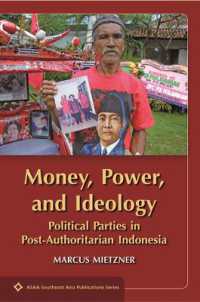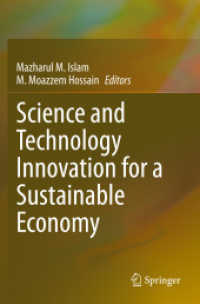- ホーム
- > 洋書
- > 英文書
- > Politics / International Relations
Full Description
This book explores various dimensions of recent international relations scholarship, taking the case of Afghanistan as a point of departure for discussion of these different themes.
Contributors investigate a broad range of topics, including international relations theory, the nature of global order, 'othering' discourses, diplomacy, international law, the transformation of war, terrorism, gender politics, social media, state building, democratisation, refugee movements, globalisation, and historical lessons. The Afghanistan case helps illuminate the complexities of all these areas of analysis, and the book takes the analysis of Afghanistan in new directions. Theoretically, the authors interrogate the Afghanistan case's implications for international relations, and vice-versa, by integrating multiple and complementary global or structural, state or institutional, and behaviouralist or leader-centric lenses. Conceptually, the chapters bridge the gap between theory and practice, thus reflecting the emergence of a problem-oriented approach to international relations scholarship. Methodologically, the research design employed by the authors is best characterised as 'analytical eclecticism'. The majority of contributors originate from Afghanistan, something which again makes this book notable, and all three editors have extensive experience from time spent in Afghanistan.
Using the Afghan case to explicate the importance of the relevance of theory and its related concepts to international relations studies, this book will be of interest to researchers in the field of international relations, Asian and Middle East Studies.
Contents
Foreword
1. Afghanistan and International Relations: An Introduction
Part I: Foundations
2. Afghanistan and the Legitimacy of Global Order
3. Exiting Afghanistan: Presidential Narratives, US Exceptionalism, and 'Othering' Afghans
Part II: Frameworks
4. Afghanistan and Diplomacy with the Taliban: From Engagement to Recognition
5. Afghanistan and International Law
Part III: Conflict
6. Afghanistan and the Transformation of War
7. The US and Afghanistan's Warlords: A Fraught Partnership with Lasting Consequences
Part IV: Transnational linkages
8. Afghanistan and Global Gender Politics
9. Afghanistan: How the Virtual Bazaar Undermined the Democratisation Process
Part V: Statebuilding
10. Statebuilding in Afghanistan: A State-Society Relational Approach
11. Afghanistan and Democratisation
Part VI: Past and future
12. Afghanistan, Refugees and Forced Migration
13. Afghanistan, Social Imaginaries, and Globalisation
14. Afghanistan and the Lessons of History








